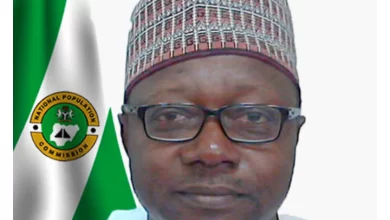Betta Edu & Halima Shehu News: Zainab Suleiman Okino Divulge The Secret Of Scammers in high places and the mad rush

Betta Edu & Halima Shehu News: Zainab Suleiman Okino Divulge The Secret Of Scammers in high places and the mad rush
Betta Edu & Halima Shehu News: Zainab Suleiman Okino Divulge The Secret: Nigeria has developed into a huge fraud zone, necessitating immediate intervention. With the discovery of certificate racketeering from nearby Cotonou in the Benin Republic, it appeared as though the scandals and scams had peaked, but then the Ministry of Humanitarian Affairs and Poverty Eradication came out with accusations of outright thievery and money laundering.
But whether by accident or purpose, the scandal involving the trio of former minister Sadiya Farouq, suspended minister Betta Edu, and suspended head of the National Social Investment Programme Agency (NSIPA), Halima Shehu, was primarily directed towards the female gender.
They were all connected to a N84.1 billion fraud within the same ministry. Ironically, a ministry that was founded to help the underprivileged, offer social services, and reduce poverty is currently embroiled in controversies. These women were successful in using the impoverished to fulfill their desires and better their own lives.
We ought to have been more cautious given the ministry’s past. The ministry appeared to be a special purpose vehicle (SPV) for former minister Sadiya Farouq, a prominent individual, as it was just established approximately five years ago. With connections to the highest echelons of the leadership, every murky business was covered up.
Furthermore, during the Buhari administration, extra funding went into the new humanitarian ministry as a result of the consolidation of all social intervention programs and organizations under the VP’s office. The ministry headed by Dr. Betta Edu was kept by President Tinubu.

The ministry and a few of its agencies must be disbanded, nevertheless, in light of the latest disclosures. The ministry has outlived its usefulness and lost its welfare emphasis due to corruption; there is nothing humanitarian about it.
First off, in an age of inclusive banking, providing cash is a foolish strategy for reducing poverty that betrays a lack of critical thinking and a regressive mindset. Additionally, it is vulnerable to misuse, and the process of choosing which households to include in social programs is deficient. The government needs to come up with more creative ways to help the underprivileged without jeopardizing the system.
It is important to remember the significance that was lost when these well-known women participated in the fraudulent activities of the ministry. They stand for two of the most important socially excluded groups in our society: women, who have been pushing for 35 percent affirmative action, and youth, whose presence in government we have been demanding. Regardless of age or gender, this is heartbreaking and says a lot about the political elite.
The frenzied hurry over the racketeering of the Cotonou certificate
has the largest population of individuals having valid passports from other nations in the world, particularly in the last 20 to 30 years after the government started to ignore its obligations. Unusualities in our educational system, like a lack of infrastructure, a labor shortage, and ongoing confrontations between the ASUU and the government that occasionally resulted in students being home for more than a year, were not addressed.
Foreign universities, which were formerly only accessible to the wealthy, quickly extended to the middle class. Scammers jumped on the bandwagon, obtaining degree certifications from foreign countries through the backdoor, without any oversight or restrictions.
However, government officials have been rushing to make up for their previous carelessness and apathetic oversight since writer Umar Audu blew their bubble a few weeks ago in a record of events that earned him a degree from a university in Cotonou, Benin Republic. In his exposé, Audu described how, in just six weeks, he was able to organize and acquire a certificate that he used to enlist in the National Youth Service Corps (NYSC).

The fact that people using forged certifications worked in our institutions at both the national and subnational levels was well known before the exposé. People pondered quietly to themselves how our system could be so loose as to let such graduates into prestigious positions meant for high-ranking members of the community. I learned of a woman who recommenced her studies in September 2021 at a Cotonou institution, and she stated that she had graduated in March 2022.
Even though she claimed to have graduated in less than six months from a Nigerian institution before the Cotonou cruise, her friends were taken aback by her rapid graduation. To be honest, nobody can honestly claim to have never heard of six-month degrees or that degrees from Ghana, Niger Republic, Kenya, Uganda, and the Benin Republic are wholly fraudulent. Those who participated in it went unpunished, the authorities turned a blind eye, and others had the gall to do the same.
The National Universities Commission (NUC), the Federal Ministry of Education, and the NYSC are all involved in the scandal involving forged certificates and the growth of universities. Numerous universities have been recognized by the NUC without due diligence.
Recommendations and grievances regarding the enlargement and furnishing of more established universities to accommodate a larger student body were ignored. When the institutional basis for regulation is compromised, it’s a free-for-all, with government agency personnel and certificate racketeers cooperating to commit fraud.
This is clear from the fact that the previous government, with Adamu Adamu serving as the minister of education, established a committee to look into phony universities and degrees from foreign universities. However, it appears the report was never published or put into action. The Audu report caused tremors throughout the nation. Because of the established cartels’ immense strength, students and dishonest authorities have experienced a roller coaster of certificate mills.

Nigeria used to be different. Our academic institutions were well regarded globally, and we did host international students. While in high school, our sole aspiration was to enroll in one of the nation’s first or second-generation colleges. There were very few private secondary schools and no private universities.
If you had the necessary credentials, getting in was not hard, but even then, many were compelled to take classes they didn’t want to take because of capacity or geographic exclusion. This was more applicable to courses in law, engineering, or medicine.
Before the rain, that was the time of the drizzles. By the time Nigeria befell us, corruption had become entrenched, ASUU had started its never-ending strikes, prospective students had to retake the JAMB, and the number of intended students had skyrocketed, making the admissions process at Nigerian universities comparable to a lottery. Then came fake degrees and overseas universities.
Even though it is wrong, people who go to clandestine universities can thrive because of the broken system in which they are never prosecuted. The NYSC is the aspect of the Audu probe that I find most bothersome. A straightforward biometrics validation could reveal con artists and imposters. In Audu’s situation, why didn’t the NYSC take that action? The officials’ self-serving attitude to public service and their avarice are the root of the problem.
That all of this occurred under leaders who blatantly permitted criminality to triumph over patriotism and the duty to do the right thing is disheartening. Even more embarrassing is the fact that these same government agencies, employing the same personnel (except for the ministers), are now competing with one another to discredit or prove their innocence about the fabricated certificate report, after having previously approved of it.

We must reimagine who we are, make greater investments to revitalize our educational system, lessen the importance of formal education, curtail and punish corruption, and ensure that impunity never again reigns. There are worldwide best practices to follow, normative procedures to follow, and ample legal resources to weed out bad actors.
The simplest approach is biometrics, which includes facial recognition and fingerprint revalidation. This is comparable to the bimodal system that INEC created for authentication and revalidation before things went wrong. Was NYSC able to handle this? What role does the Ministry of Education play if reviewing credentials is too difficult for them, or if NUC finds it too difficult to withhold accreditation? To be honest, before Nigeria turns into a true criminal organization, we need to wake up and take the proper action.







